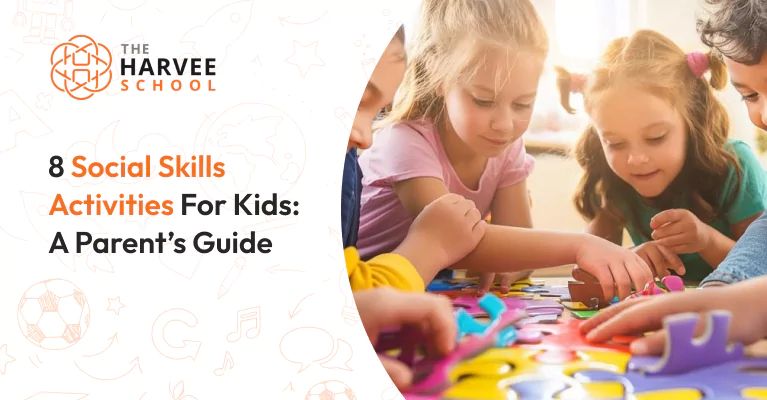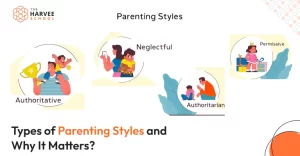8 Social Skills Activities For Kids: A Parent’s Guide
As your little one steps into preschool, they’re not just entering a world of numbers and letters but also going to make friends, share, and learn to be a part of a group. Developing social skills is a key part of their success both inside and outside the classroom. Here are eight essential social skills every kindergartener should learn, with practical tips for helping them practice at home.
Why Social Skills Are Crucial for Kids’ Growth?
Social skills are how we interact with others. They include things like talking and listening well, understanding body language, and showing empathy. Good social skills help us get along with people, make friends, handle conflicts, and work better together. They’re important for happy relationships and success in life.
8 Social Skills Activities for Preschoolers
1. Listening to Others
One of the first social skills your child will need in kindergarten is the ability to listen attentively. In a classroom setting, listening is essential for following directions, understanding lessons, and engaging with peers. At home, you can help your child develop this skill by practicing active listening during conversations. Ask questions about what they’ve shared to show interest and encourage them to do the same.
How to Teach It?
- Make eye contact and nod when your child is speaking.
- Ask them to repeat key details in stories or instructions.
2. Sharing and Taking Turns
Sharing is often a new and challenging concept for young children, but it is a crucial skill for making friends and playing cooperatively. Whether it’s sharing toys during playtime or taking turns on the playground, your child will benefit from understanding that everyone’s needs are important.
How to Teach It?
- Encourage turn-taking during family board games.
- Praise them when they share without prompting.
- Explain the difference between sharing and taking turns, emphasizing fairness.
3. Expressing Emotions and Needs
Children in kindergarten often struggle to express their needs and emotions effectively. Teaching them to “use their words” instead of acting out (tantrums) when they feel frustrated or overwhelmed is key to preventing conflicts and developing understanding. Help your child build the vocabulary they need to express themselves in a calm and constructive way.
How to Teach It?
- Model emotion-labeling by saying things like, “I feel happy because…”
- Encourage them to express how they feel, whether they’re excited, sad, or frustrated.
- Role-play different scenarios where they need to ask for help, such as saying, “Can I have a turn?”
4. Cooperation and Teamwork
Kindergarten is filled with group activities that require cooperation, such as class projects or team games. Teaching your child the value of working with others is essential for success in both academic and social settings. Cooperation also involves understanding different perspectives and compromising when necessary.

How to Teach It?
- Engage in cooperative activities, like building a puzzle or baking cookies together.
- Highlight the importance of teamwork with phrases like, “Let’s work together!”
- Celebrate instances where they successfully collaborate with others.
5. Problem-Solving Skills
At school, children will encounter situations where they need to solve problems, whether it’s resolving a disagreement with a friend or figuring out how to share a limited number of toys. Teaching problem-solving skills at home can help them navigate these challenges without frustration.

How to Teach It?
- When conflicts arise, guide your child through potential solutions. Ask them, “What can fix this problem?”
- Encourage independent problem-solving by giving them small challenges, like building something with blocks or finding a way to share with a sibling.
- Praise their efforts to solve problems peacefully.
6. Adaptability and Handling Transitions
Change is a big part of kindergarten life, whether it’s moving from one activity to another or adjusting to new rules. Helping your child become adaptable and handle transitions smoothly will reduce anxiety and ensure they can cope with daily school routines.
How to Teach It?
- Establish routines at home, such as set times for meals or bedtime, to give your child practice in handling transitions.
- Use timers or visual cues to help them prepare for transitions.
- Discuss upcoming changes and reassure them that it’s okay to feel unsure, but adapting is important.
7. Showing Empathy
Empathy is the ability to understand and care about how others feel. For a kindergartener, this means being aware of classmates’ emotions and responding kindly. Empathy is crucial for building strong, positive relationships, and it helps children navigate social situations with compassion.
How to Teach It?
- Read books with your child that highlight different emotions and ask questions like, “How do you think this character feels?”
- Encourage your child to notice how others are feeling. If a friend looks sad, ask, “What can we do to help?”
- Model empathetic behavior by showing care and concern for others in your own actions.
8. Respecting Boundaries and Personal Space
Understanding personal space and respecting boundaries is another vital social skill for kindergarteners. Learning not to interrupt, touch others without permission, or stand too close are all part of showing respect for others.
How to Teach It?
- Play games that focus on waiting for a turn or not interrupting, like “Red Light, Green Light.”
- Talk about “personal space bubbles” and explain why it’s important to give people room.
- Praise your child when they respect others’ personal space or ask before taking someone else’s belongings.
How to Support Your Child’s Social Development at Home?
Practicing social skills doesn’t have to be a formal process; everyday interactions offer plenty of opportunities for teaching. Here are some ways to support your child’s social growth:
Set an Example: Children learn by observing the behavior of the adults around them. Show empathy, listen actively and cooperate in your daily interactions so they can mimic these behaviors.
Play Dates and Group Activities: Arrange playdates or enroll your child in group activities like sports or music classes to give them practice interacting with peers.
Praise Positive Social Behaviors: Reinforce good social skills with positive feedback. A simple “I noticed how nicely you shared with your friend” can go a long way in encouraging repeat behavior.
Use Books and Media: Children’s books and shows often explore social themes, offering great teaching moments. After watching or reading, discuss the characters’ actions and how your child might handle similar situations.
Final Thoughts
Developing strong social skills takes time, practice, and patience. By working on these eight essential social skills with your kindergartener, you’ll help them build a strong foundation for making friends, collaborating with others, and feeling confident in social situations. Remember, social growth happens gradually, so celebrate small victories along the way as your child navigates this exciting new chapter.






